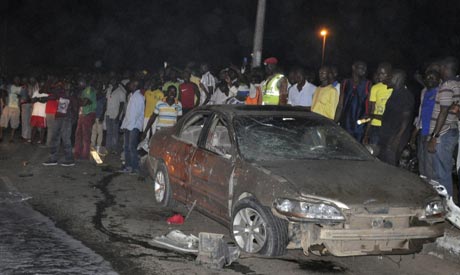
People gather near a damaged car following a bombed explosion in Abuja, Nigeria, Thursday, May 1, 2014 (Photo: AP)
A car bombing at a bus station on the outskirts of Nigeria's capital killed at least 18 people and injured 80, an official said Friday, just weeks after Boko Haram Islamists attacked the same spot.
The explosion rocked the crowded Nyanya bus terminal just a few kilometres from central Abuja at roughly 8:00 pm (1900 GMT) on Thursday, 50 metres from the site of an April 14 bombing that killed at least 75 people.
The April attack was the deadliest ever in Nigeria's capital and raised security concerns about a World Economic Forum summit set for Abuja next week.
The summit, which includes a visit from Chinese Premier Li Keqiang, is almost certain to go ahead, but the latest unrest will pile further pressure on Nigeria's security services who have struggled to contain Boko Haram violence.
"The update we have is 18 dead and a total of 80 injured," said Manzo Ezekiel, spokesman for the National Emergency Management Agency (NEMA).
NEMA spokesman Muhammad Sani Sidi has said that victims were being treated at several Abuja area hospitals and complete casualty figures were still being gathered.
Boko Haram's leader Abubakar Shekau, declared a global terrorist by the United States, said his group carried out the April 14 bombing in a video message obtained by AFP.
Much of Boko Haram's recent violence has targeted the remote northeast, the group's historic stronghold, where more than 1,500 people have been killed already this year.
A second attack in three weeks just a few kilometres from the seat of government highlighted the serious threat the Islamists pose to Africa's most populous country and largest economy.
President Goodluck Jonathan has faced intense pressure over the unrest, which has continued unchecked despite a massive year-long military offensive in the northeast aimed at crushing Boko Haram's uprising.
The Nyanya station was completely inaccessible after Thursday's blast, with the one access road blocked and cars backed up for several kilometres.
Ezekiel, who said he lives near Nyanya and heard the bomb go off, described the road leading to the station as "jam packed", late Thursday adding that ambulances and rescue workers had struggled to reach the area.
Emergency work was further complicated by darkness at the station, which was very poorly lit after sundown.
Access had improved early Friday, Ezekiel told AFP, explaining that security services were still restricting entry to the site but that authorised vehicles were moving in and out freely.
The bombing came amid mounting public outrage after one of Boko Haram's most shocking attacks, the mass kidnapping of nearly 200 girls from their school in the northeast.
Officials and locals have offered contradictory figures for the number of girls taken, but the school's principal has said that 187 are still being held hostage.
Hundreds of people marched on parliament on Wednesday to demand that government and the military do more to rescue those still being held.
Boko Haram, which says it wants to create a strict Islamic state in Nigeria's mainly Muslim north, has attacked schools, churches, mosques and various symbols of authority in an insurgency that has killed thousands since 2009.
Short link: